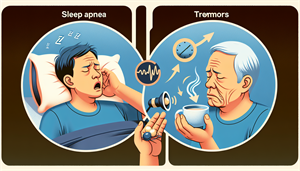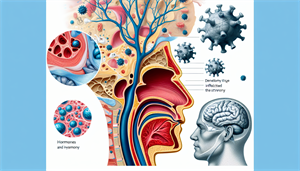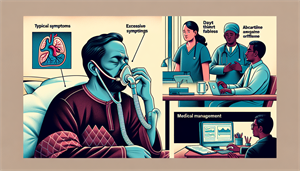
Can Sleep Apnea Cause Tremors?
Have you ever awakened to an unsettling tremor in your body? It might be more than just a random occurrence. Sleep apnea, a common sleep disorder, could be the culprit behind these tremors. This condition not only disrupts your sleep but also has the potential to trigger an array of health issues if not addressed promptly. But can sleep apnea cause tremors, and what can we do about it? Let’s delve into the world of sleep disorders and unravel this complex relationship.
Key Takeaways
Sleep apnea, particularly Obstructive Sleep Apnea, can result in severe health issues, including type 2 diabetes, heart disease, and neurological symptoms such as tremors due to oxygen deprivation and brain damage caused by interrupted breathing during sleep. The relationship between sleep apnea and muscle tremors is significant, with tremors being a neurological symptom due to disrupted oxygen supply to the brain, leading to inconsistent muscle signaling that may manifest as tremors during sleep or waking moments. Treatment options like Continuous Positive Airway Pressure (CPAP) therapy, lifestyle modifications, and medications can manage sleep apnea and its associated tremors, potentially reversing neurological damage and improving overall health if diagnosed and addressed early.
Understanding Sleep Apnea and Its Symptoms
Sleep apnea, a common sleep disorder, is characterized by repeated pauses in breathing during sleep, leading to disruptive snoring and excessive daytime fatigue. The two main types are Obstructive Sleep Apnea (OSA), the most common form, and Central Sleep Apnea (CSA). OSA is caused by the blocking of the airways, while CSA happens when the brain fails to signal the muscles to breathe. If left untreated, sleep apnea can lead to several significant health issues such as type 2 diabetes, heart disease, stroke, and even brain damage. This brain damage may result in symptoms such as fatigue, headaches, memory loss, and difficulty concentrating. Hence, immediate medical attention is advised if you’re exhibiting symptoms of sleep apnea to avoid worsening of severe health conditions.
The Relationship Between Sleep Apnea and Muscle Tremors
Sleep apnea and muscle tremors share a close relationship, with the key link being oxygen deprivation and its neurological impact on the body. This deprivation can result in irregular oxygen supply to the brain and body, causing involuntary muscle movements during sleep, ultimately leading to symptoms such as waking up shaking. But how exactly does this happen? We will examine how oxygen deprivation and the neurological impact of sleep apnea result in muscle tremors.
Oxygen Deprivation and Muscular Activity
Sleep apnea can induce oxygen deprivation through sudden drops in blood oxygen levels during sleep. This lack of oxygen can have several physiological consequences, including: Nocturnal hypoventilation Oxygen desaturation Respiratory muscle weakness Changes in skeletal muscle structure and function These changes can disrupt normal breathing, affect the oxygen supply to the brain and body, and eventually cause inconsistent messages to be sent to the muscles, resulting in jerking or shaking. Diminished oxygen supply, or hypoxia, can accelerate muscle fatigue, and augmented oxygen supply, or hyperoxia, can diminish the rate of fatigue. Alterations in arterial oxygen content can also impact the vasodilator response to exercise. The jerky movements in limbs due to oxygen deprivation, specifically positive myoclonus, may arise from cortical and/or subcortical structures.
Neurological Impact of Sleep Apnea
Beyond impacting your breathing, sleep apnea can also harm the brain’s white matter, particularly in severe cases where deep sleep is reduced. This brain damage, which can be caused by both chronic sleep deprivation and oxygen deprivation, can lead to a range of neurological symptoms such as tremors, memory issues, and difficulty concentrating. The neurological impact of sleep apnea can have far-reaching consequences, affecting not only your sleep but also your overall health and well-being.


